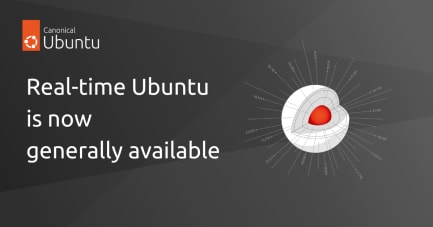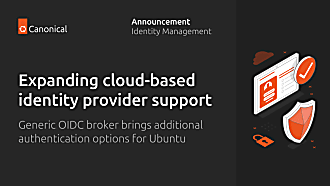Edoardo Barbieri
on 27 April 2022
Real-time Ubuntu 22.04 LTS Beta – Now Available
On 21 April 2022, Canonical announced Real-time Ubuntu 22.04 LTS, available in beta.
Based on upstream v5.15, the 22.04 LTS kernel integrates the out-of-tree PREEMPT_RT patch for x86_64 and AArch64 architectures. Once in GA, the new real-time kernel will power the next generation of robotics, IoT, and telco innovations by providing a deterministic response time to their extreme low-latency requirements.
Deterministic response times
The scheduler of the Real-time Ubuntu beta can preempt threads in the kernel, including in critical sections, interrupt handlers, and interrupt-disable code sequences, guaranteeing bounded responses. By minimizing the non-preemptible critical sections in kernel code, the PREEMPT_RT patches, not fully upstream yet, make the kernel more preemptive than mainline.
Getting ready for production
As this is a beta release, it comes with no support, and it is advised not to use it for production workloads. We are committed to bringing the real-time kernel to production level, and your feedback will help us get there. Please consider testing and positively impacting the Ubuntu community by reporting any bugs you may encounter here.
Also, consider joining our free beta programme for an open communication channel with our team, provide feedback, and share suggestions. As a Real-time Ubuntu beta tester, we will notify you first once the kernel is production-ready.
Get the real-time kernel beta
The beta kernel is available for free for personal use via Ubuntu Pro, the most comprehensive Linux enterprise subscription, covering all aspects of open infrastructure.
To attach your personal machine to a Pro subscription, please run:
pro attach <free token> To enable the real-time beta kernel, run:
pro enable realtime-kernel Please note you will need to manually configure grub to revert back to your original kernel after enabling real-time.
For more information:
pro help realtime-kernelLearn more
We recently hosted a webinar covering:
- What real-time is and common misconceptions
- Market applications
- Linux kernel preemption
- Preemption modes available in mainline
- PREEMPT_RT
- Real-time Ubuntu 22.04 LTS Beta
Thanks to everyone who attended, asked questions and provided feedback throughout the discussion! For those who couldn’t make it, the webinar is now available on-demand.
About Canonical
Canonical is the publisher of Ubuntu, the OS for most public cloud workloads as well as the emerging categories of smart gateways, self-driving cars and advanced robots. Canonical provides enterprise security, support and services to commercial users of Ubuntu. Established in 2004, Canonical is a privately held company.





